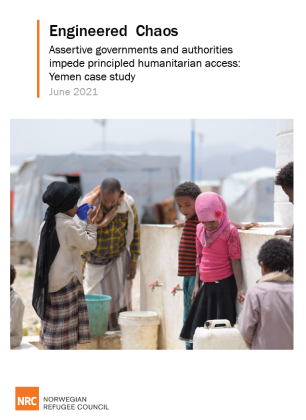Engineered Chaos: Assertive governments and authorities impede principled humanitarian access: Yemen case study
Principled humanitarian access is the cornerstone of humanitarian programming. It is safeguarded under international legal frameworks, but by no means guaranteed during complex emergencies. Many studies on the issue focus on conflict-related constraints, but an internal Norwegian Refugee Council (NRC) survey in 2020 found bureaucratic and political impediments to be the most significant restriction on humanitarian access.
This case study analyses the scope and impact of such obstacles to humanitarian organisations in reaching communities in Yemen between mid-2019 and October 2020. The access situation in the country deteriorated steadily during 2019, and 90 per cent of reported access incidents were the result of bureaucratic restraints.
The study is based on desk research, focus group discussions and more than 20 key informant interviews with representatives from UN agencies and international and local NGOs, which took place over a six-month period. The research demonstrates the severe impact that bureaucratic and political constraints have on principled humanitarian responses and programming.
Download the report.Download the executive summary.
